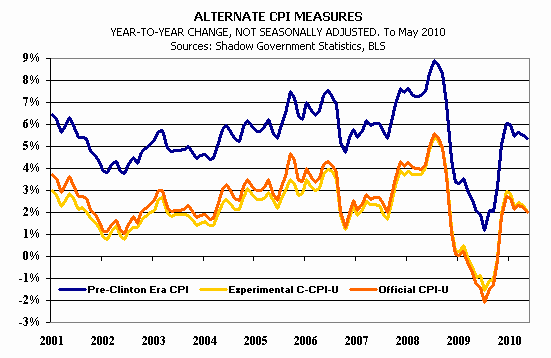Walter J. “John” Williams is an economist with a website called Shadow Government Statistics..
It leads off with an arresting graph claiming to show a big gap between the true rate of inflation and the official Consumer Price Index (CPI):

I don't know if I am qualified to opine as to how accurate this chart is, and to be honest I haven't delved deep enough into the supporting materials to form a view.
But the bones of the argument are simple: the revised official Consumer Price Index (CPI) is a lie, since it leaves out food and energy, and these goods are a major part of household purchases. As the prices of these goods are rising much faster than the items in the basket tracked by the CPI, the series fails to capture the real measure of inflation.
A corollary of this conclusion is that most workers' wages, which were barely keeping up with the CPI if that, have in fact been eroding in real terms (while the richest get much richer).
Why might a government design a misleading CPI in this fashion? The answer is overdetermined. There may be some technical advantages to ignoring cyclical commodities (those pesky 'seasonal adjustments') and manipulated foreign / exogenous commodities, but surely these must pale in the face of the importance of food and fuel?
One cynical reason is that the rate of increase of lots of federal transfer payments are based on the CPI. Keep the CPI down and the feds don't have to pay beneficiaries as much. Should payments to social security beneficiaries be much higher?
Another reason that I can imagine (and this is just my idea, not one I found at Shadow Government Statistics) is sort of Straussian. Inflation has a psychological element: people raise prices (or wage demands) in an effort to at least keep pace with inflation, thus spurring more of it. If inflation gets out of control, especially if coupled with lousy monetary and fiscal policy, this competition to stay ahead/stay even can even lead to hyperinflation. One way to keep inflation lower than it might otherwise be is to persuasively mislead people as to extent. If people believe the CPI is a good measure of inflation, and they are therefore deluded into believing that inflation is 2-3% lower than it actually is, that must surely have a significant anti-inflationary effect.
At least until it is found out. Note that Williams also argues that if inflation is measured right, the GDP deflater grows too, shrinking the true measure of GDP…. Do we have national money illusion too?

